Greg Rushton, director of the Tennessee STEM Education Center and co-director of the Office of Research and Sponsored Programs, likes being a part of a scholarly community like the one at MTSU that values the sharing of knowledge through teaching and mentoring.
“The success I’ve experienced during my academic career has come in large part from the invitation of others to join such an endeavor; I’m now in a position to do the same for others and I count it a privilege to do so,” Rushton said.
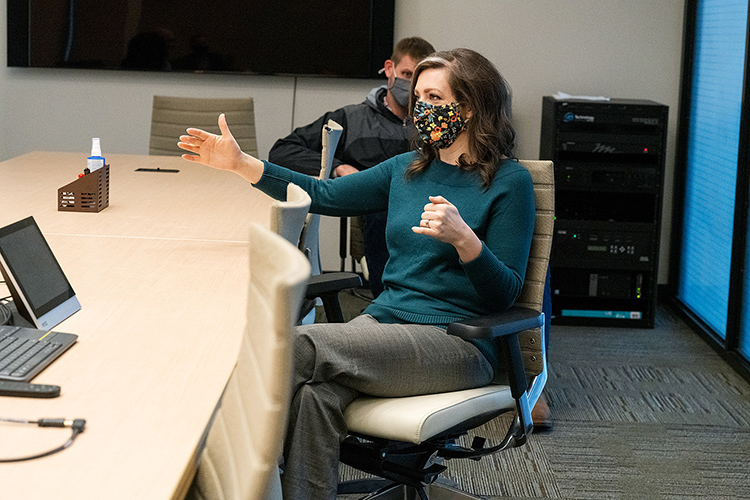
Tiffany Rogers, a Middle Tennessee State University assistant professor of psychology, talks with peers, including fellow MTSU assistant professor Blake Whitman from the School of Concrete and Construction Management in the background, in a conference room of the Science Building on campus on March 31, 2021. (MTSU photo by Andy Heidt)
Rushton became True Blue in 2018 and brought with him, along with his many attributes, a career full of research experience. He worked at SUNY Stony Brook in New York as an associate director of the Institute for STEM Education and an associate professor of chemistry. He has also directed multiple research projects, with external funding in excess of $17 million since 2005.
The presence of Rushton and other research-experienced faculty highlight the university’s focus on increasing faculty grants, research and collaboration.
“We have implemented many initiatives to help growth the total number of faculty at MTSU who are interested in, and can successfully, write grants and contacts to support their scholarship,” said David Butler, vice provost for research.
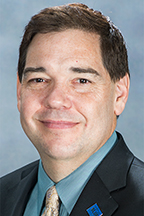
Dr. David Butler
“Sustained research over time gains attention as projects make a difference locally, within the state, nationally and internationally,” Butler said of the benefits of this faculty research focus. “The more grants and contracts received, and the more scholarship produced following the funding, the higher the visibility of the university. This higher level of visibility increases the reputation and thus the ability to successfully secure more grants and contracts in the future in a positive spiral.”
Butler also said that strong researchers from leading research institutions, such as Rushton, are interested in bringing those skills to MTSU.
“We have the ability to hire them to be both great researchers and instructors in the classroom,” he said. “Making such strong hires over time will produce an increase in scholarship production over time. Additionally, these new hires produce positive ripples within the university often sharing with others for them to join in on projects for a collective benefit.”
Since his arrival at MTSU, Rushton has prioritized understanding the cultural and structural barriers to expanding faculty research and identifying and implementing solutions to address and overcome them.
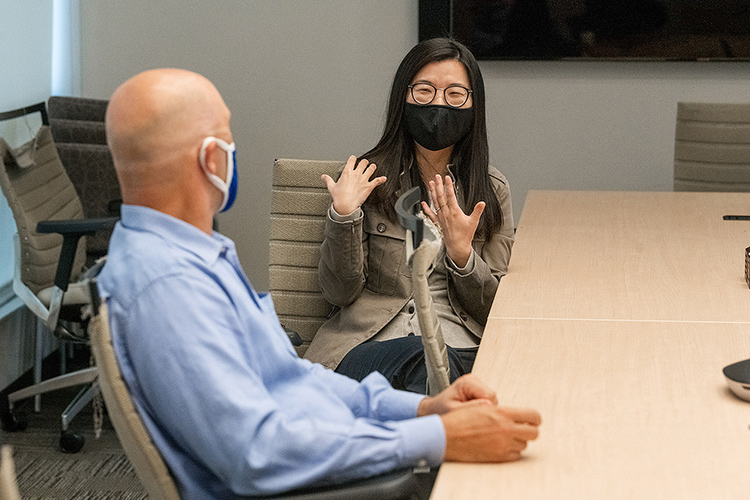
Greg Rushton, director of the TN Stem Education Center at Middle Tennessee State University, collaborates with Ying Jin, an MTSU associate professor of psychology, in a conference room of the Science Building on campus on March 31, 2021. (MTSU photo by Andy Heidt)
He tries to reach out to any faculty interested in becoming more research active or developing further as a scholar to see if there are ways he can contribute to their success.
Read on to learn more about Rushton and some of the faculty he has collaborated with to create informal, cooperative faculty research communities.
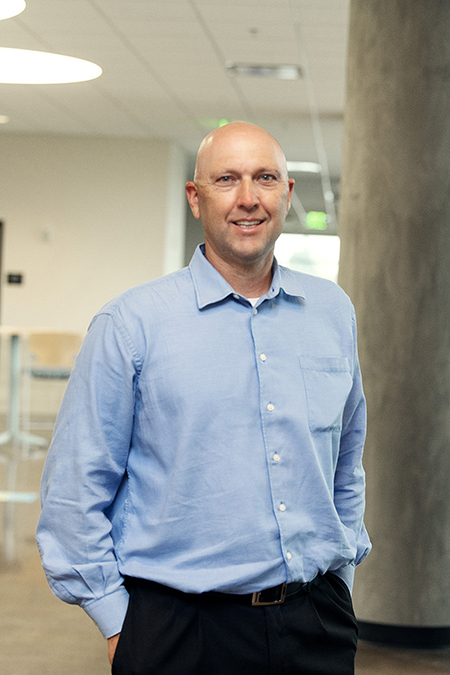
Greg Rushton
- Greg Rushton
- Began work at MTSU in 2018
- Director of TN Stem Education Center, or TSEC, and chemistry professor
What is your field of research?
“Broadly, I work in the areas of chemistry education research and STEM teacher leadership,” Rushton said.
Share about one of your most rewarding faculty research collaborations so far at MTSU.
“One of the many meaningful activities I’ve been involved with is the Grant Writing Enhancement Program, or GEP, through the Office of Research and Sponsored Programs, or ORSP,” he said.
“I get to meet with early career faculty members across a range of research areas to understand their priorities, concerns and challenges. We then work together to find solutions and resources to ensure a smooth transition into scholarly activity and productivity during the first few years here.”
How does the university support faculty research?
“The ORSP has a customer service-oriented mission, seeking to partner with individuals and teams to ensure a productive and efficient experience when applying for, or administering, externally funded awards,” he said.
“New faculty hires have access to startup funds and mentoring programs during their pre-tenure years; research active faculty are afforded time and space in their workloads to develop their scholarship.”
Rushton added that since he arrived at MTSU recently, he may not yet be aware of all the ways research is promoted and supported on campus.
Why is faculty research important for the university?
“Faculty come to MTSU with a love for their research topic and expertise that has taken many years to develop,” he said. “Research allows for the professor to engage in the joys and frustrations of the learning process right alongside the students in their classes. It connects us all in the pursuit of discovery and wonder that makes the university a special place to live and work.”
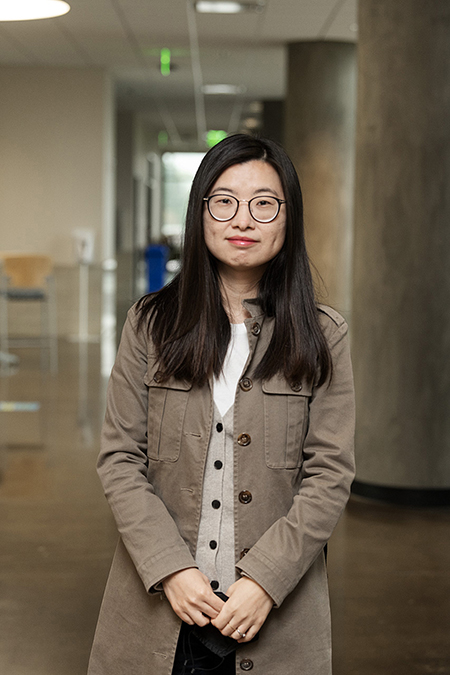
Ying Jin
- Ying Jin
- Began work at MTSU in 2013
- Associate professor of psychology
What is your field of research?
“Educational and psychological measurement (and) statistical modeling,” Jin said.
Share the most memorable grant or research program you have worked on.
“I worked with TSEC on writing an Institute of Education Sciences grant proposal last year,” she said. “It was a large-scale educational grant and involved collaborations from multiple faculty and school systems.
“It was most memorable because the process to put this grant proposal together required intensive communication and collaboration with faculty and staff with different educational backgrounds and expertise. Writing grants is simply not a task that can be completed by one person.”
How has the university fostered a community and culture of research among the faculty?
“Increased workshops and seminars on grant writing,” she said.
What opportunities does the university offer for faculty to collaborate and support each other in research?
“For one thing, I benefit tremendously from working with TSEC staff to initiate my grant writing activities,” said Jin. “They are extremely helpful.”
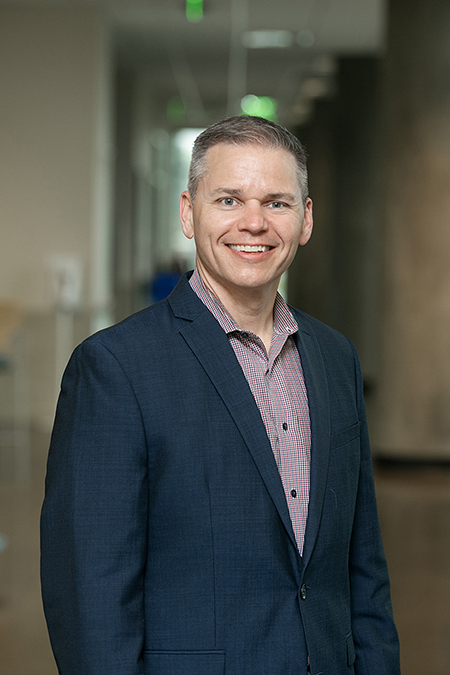
Chaney Mosley
- Chaney Mosley
- Began work at MTSU in Fall 2018
- Assistant professor of agricultural education
What is your field of research?
“Career and technical education, agricultural education, teaching controversial issues (and) teacher professional development,” Mosley said.
Share the most memorable grant or research program you have worked on.
“I’m currently working on a collaborative grant that addresses farm and ranch stress in the southern region of the United States,” he said. “This grant involves leading a collaborative team of agricultural education faculty from 13 states as well as Puerto Rico to investigate school-based agricultural education teacher knowledge, opinions and professional development needs associated with suicide and experiences with student suicide.
“Results of research studies will inform outreach efforts targeting agriculture teachers, so that they are better prepared to identify and respond to suicide ideation. This will be the most memorable project of my academic career. It represents the first funded project for which I am site primary investigator, and the topic is of great importance to me, having experienced student suicide as an educator. Also, because our research will lead to resources that support our target audience, it’s an excellent example of putting research into practice, which is part of what motivates me to conduct research.”
How has the university fostered a community and culture of research among the faculty?
“When I started at MTSU, I wasn’t sure where to begin,” he said. “I reached out to faculty from my graduate program at Virginia Tech for advice and sought advice from others in my department. Experiences prior to joining MTSU caused me to appreciate the power of collaboration, so I pulled together other assistant professors in my department for a brainstorming session about possible research topics and funding opportunities and attempted to identify intersections of our interests.
“The result of that initiative was two funded proposals thus far as well as some informal mentorship from other faculty. Since I was hired, though, ORSP has started a faculty development program for new faculty focused on grant writing, I believe.”
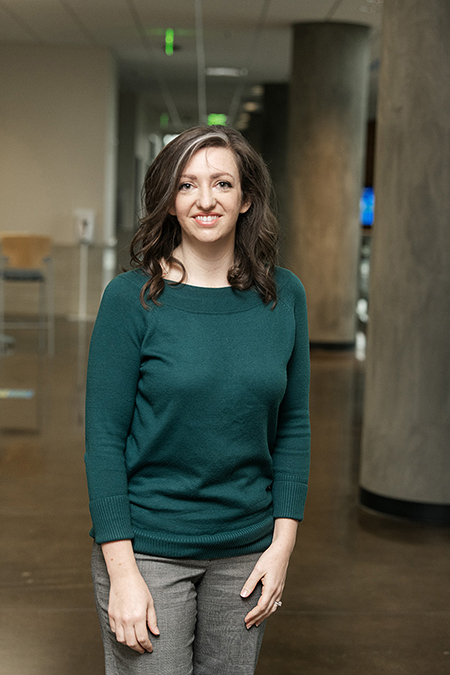
Tiffany Rogers
- Tiffany Rogers
- Began work at MTSU in Fall 2015
- Assistant professor of psychology
What is your field of research?
“Social and affective neuroscience,” Rogers said.
Share the most memorable grant or research program you have worked on.
“My most recent grant submission was for an Academic Research Enhancement Award for undergraduate-focused institutions through the National Institutes of Mental Health, or NIMH,” she said.
“This grant is in collaboration with Dr. Deranda Lester of the University of Memphis. The grant would allow students of each institution, MTSU and U of M, to cross-train by traveling to each institution and becoming trained in the techniques of each researcher, myself and Dr. Lester. The students would also be mentored by each researcher, and students could be paid for their work in the labs.”
How has the university fostered a community and culture of research among the faculty?
“The Office of Research and Sponsored Projects has developed the Grant Writing Enhancement Program through which I have gained a community of like-minded researchers that have the same goals of developing research labs and gaining funding for their research,” she said. “We have had excellent mentorship opportunities through the program as we collectively address opportunities and challenges in the grant-writing process.”
What opportunities does the university offer for faculty to collaborate and support each other in research?
“Yes, through the GEP program and through other research initiatives like Undergraduate Research Experience and Creative Activity teams grants and brown bag presentations,” said Rogers.
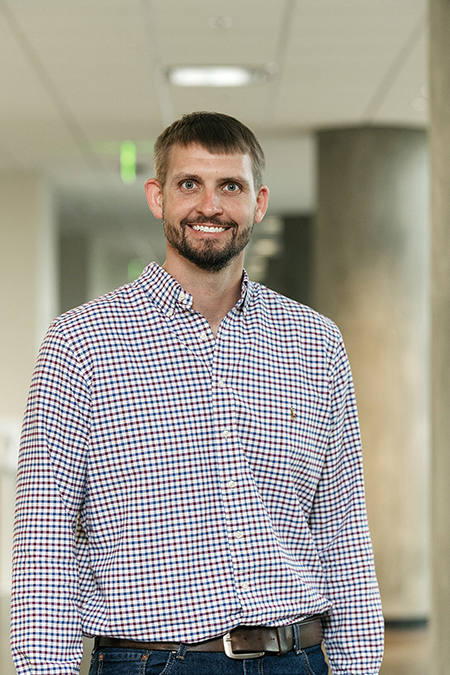
Blake Whitman
- Blake Whitman
- Began work at MTSU in Fall 2019
- Assistant professor in concrete and construction management
What is your field of research?
“Construction site stormwater management,” Whitman said.
Share the most memorable grant or research program you have worked on.
“In the past, I’ve worked on state Department of Transportation grants,” he said. “We were recently notified that a proposal sent to the Nebraska Department of Transportation was selected for funding. This project will get kicked off in the late summer to early fall of 2021.”
How has the university fostered a community and culture of research among the faculty?
“The Grant Writing Enhancement Program headed by the ORSP is an excellent community of young and new faculty beginning their academic research journey,” he said. “This program allows members to share their grant and research successes stories as well as challenges within the grant world.
“Most of us are in different departments and have very different backgrounds, but this space allows us to develop a feel of what others are doing to become successful.”
What opportunities does the university offer for faculty to collaborate and support each other in research?
Since Whitman’s field of study is so specific, there are not many faculty members to collaborate with directly.
“Because of this, I focus on collaborating with other universities,” he said. “Thus far, this has been effective.”
David Butler’s dream is for all faculty, no matter their field, to inquire and see that there is funding and support available.
“Humanities, art, business, science or social science … there is funding available for their scholarship … to support their work. Often a project that is small can be made larger in size and scope with grant and contact funding, creating a larger influence for the scholarship produced and the faculty members and students involved in the project,” he said.
“I hope they know that the ORSP is here for them to help them succeed in this dream and make it a reality.”
To learn more about faculty research and all research opportunities at MTSU, visit the Office of Research and Sponsored Programs website.
— Stephanie Barrette (Stephanie.Barrette@mtsu.edu)
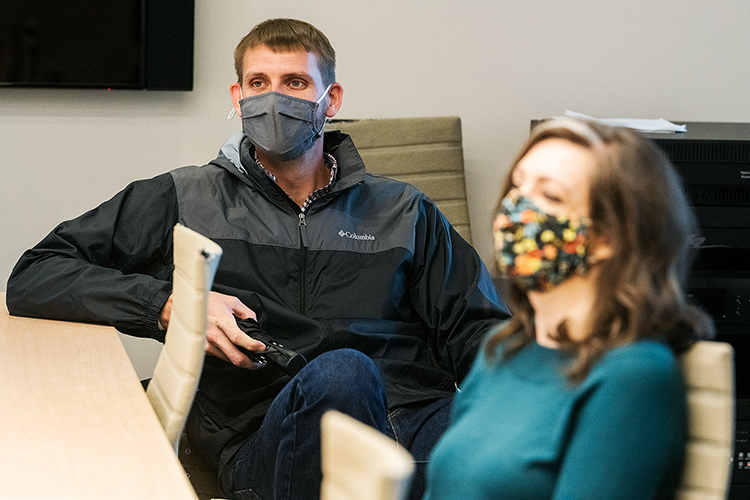
Blake Whitman, a Middle Tennessee State University assistant professor in concrete and construction management, shares a conversation with colleague Tiffany Rogers, an assistant professor of psychology, and others in a Science Building conference room on campus on March 31, 2021. (MTSU photo by Andy Heidt)

COMMENTS ARE OFF THIS POST